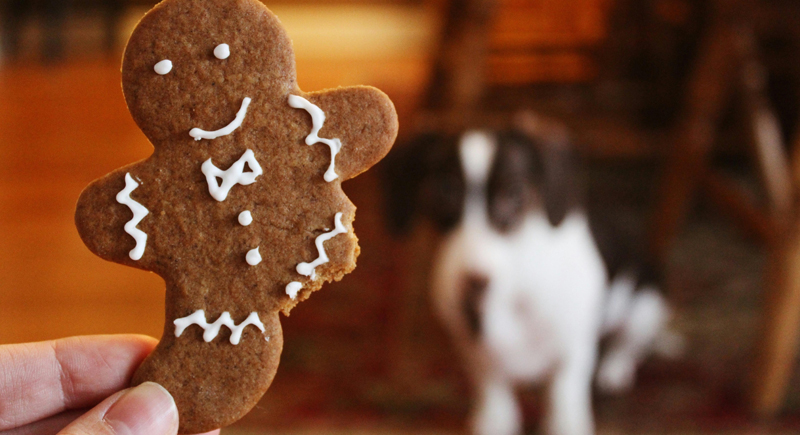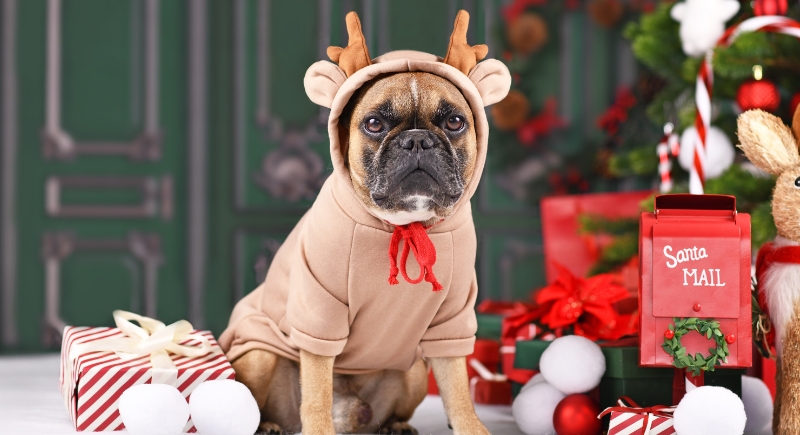17 Holiday Decor Items That Are Dangerous for Pets
The holidays are a magical time, but some decorations can pose hidden risks to our pets. From sparkling ornaments to fragrant plants, festive decor often tempts curious pets to sniff, chew, or paw at things they shouldn’t. Keeping pets safe while celebrating is key—here are 17 common holiday items to watch out for.
Tinsel

Credit: iStockphoto
Tinsel may look beautiful on your tree, but it’s incredibly tempting for pets—especially cats. If swallowed, it can cause serious digestive issues, like blockages or tears in the intestines. Even small pieces can create big problems if they become tangled in your pet’s stomach or intestines. To keep your pets safe, consider skipping tinsel altogether or using pet-friendly alternatives like ribbon garlands or fabric decorations.
Glass Ornaments

Credit: flickr
Shiny, fragile, and often dangling from trees, glass ornaments can be irresistible to playful pets. Unfortunately, if knocked over or chewed, they can break into sharp pieces that may cut paws or mouths. Curious pets may also try to eat smaller pieces, which can lead to internal injuries. Opt for shatterproof ornaments or hang breakables high out of reach to avoid accidents.
Holiday Lights

Credit: freepik
Twinkling holiday lights are fun to look at, but the cords can be dangerous for pets who like to chew. Biting through wires can cause electrical shocks or burns. Additionally, pets might get tangled in the cords, creating a choking hazard. To protect curious pets, use cord covers or keep lights off the lower part of the tree and unplug them when you’re not around.
Poinsettias

Credit: flickr
Poinsettias add a festive touch to any home, but they’re mildly toxic to pets if ingested. While symptoms like drooling or stomach upset are usually mild, it’s best to keep these plants far from curious noses. Chewing on the leaves can also irritate your pet’s mouth or skin. Pet-safe plants like faux poinsettias or silk flowers are a safer option.
Candles

Credit: iStockphoto
The warm glow of candles creates the perfect holiday vibes, but pets can accidentally knock them over, leading to burns or fires. Cats may even try to swat at flickering flames. The wax can also pose a danger if spilled, causing burns on paws or fur. Use flameless LED candles for the same ambiance without the risk—or keep real candles in pet-free areas.
Snow Globes

Credit: iStockphoto
These charming decorations seem harmless, but many snow globes contain antifreeze (ethylene glycol), which is highly toxic to pets. If one breaks, even a small amount of the liquid can be dangerous if ingested. Pets might also want to lick the liquid out of curiosity. Keep snow globes in secure places where pets can’t knock them over.
Ribbons and Bows

Credit: iStockphoto
Loose ribbons and bows can also cause serious digestive problems, such as blockages. Cats are especially drawn to these string-like items. Even chewing on them can lead to choking or cuts in your pet’s mouth. Always pick up loose ribbons and consider using gift bags or fabric ties instead to avoid temptation.
Real Christmas Trees

Credit: iStockphoto
Real Christmas trees bring a wonderful scent to your home, but the water in the tree stand can be dangerous for pets. It often contains fertilizers or preservatives that are toxic when ingested. Pine needles can also be sharp and cause irritation if eaten or stepped on. Keep tree water covered or use a stand that doesn’t allow pets to drink from it.
Artificial Snow (Flocking)

Credit: iStockphoto
Artificial snow, used to create that frosty winter look, may contain chemicals that can irritate a pet’s mouth or stomach if licked. Even small amounts can make pets sick. Pets may also inhale the powdery substance, which can cause respiratory issues. Avoid using artificial snow, or choose a pet-safe, non-toxic alternative for your holiday decor.
Chocolate Decorations

Credit: iStockphoto
Hanging chocolates on the tree is a fun tradition, but don’t forget that chocolate is toxic to both dogs and cats. Even small amounts can cause vomiting, diarrhea, or worse. Pets with a strong sense of smell can easily sniff them out, even if they’re wrapped. If you love edible decor, stick to pet-safe options or hang treats in areas where your pets can’t reach them.
Potpourri

Credit: iStockphoto
Scented potpourri is a popular way to make your home smell festive, but it can be harmful to pets. If eaten, dried potpourri pieces may irritate a pet’s mouth or stomach, and liquid potpourri can contain toxic essential oils. The strong scent may also attract curious pets, leading them to investigate. Place it in high, unreachable areas—or skip it altogether.
Pine Needles (Real or Artificial)

Credit: flickr
Whether from real or fake Christmas trees, stray pine needles can cause issues if swallowed by pets. They may irritate their mouths or even lead to injuries in the digestive tract. Stepping on needles can also hurt your pet’s paws or cause small cuts. Regularly vacuum or sweep around your tree to keep the area needle-free for curious pets.
Holiday Wrapping Paper

Credit: flickr
While wrapping paper seems harmless, pets might chew or eat it, especially if it’s coated in glitter, foil, or other decorative finishes. These can cause digestive upset or blockages. Tape and bows stuck to the paper can also pose a choking hazard. After opening gifts, clean up loose wrapping paper quickly to prevent your pets from snacking on it.
Decorative Berries

Credit: freepik
Many holiday decorations, like wreaths or centerpieces, include faux or real berries. While they’re festive, these berries can be harmful if chewed or swallowed. Fake berries may contain toxic dyes or plastic pieces that can cause stomach irritation. Real berries, like holly or mistletoe, are known to be poisonous to pets and should be avoided.
Scented Holiday Oils or Diffusers

Credit: iStockphoto
As mentioned earlier, holiday-scented essential oils, often used in diffusers, can be harmful to pets. Oils like pine, cinnamon, or peppermint can cause skin irritation or stomach upset if ingested. Pets may also knock over diffusers, spilling the oil onto their fur or surfaces they’ll lick. Opt for pet-safe diffusers or avoid using strong essential oils in areas your pets frequent.
Edible Tree Ornaments and Cookie Decorations

Credit: pexels
Homemade or store-bought edible ornaments and cookie decorations might look adorable, but they’re a magnet for pets. The sweet smells of sugar, chocolate, or spices can lure dogs and cats into taking a bite, leading to upset stomachs or even poisoning. Hang these treats high and securely.
Holiday Costumes for Pets

Credit: Getty Images
While dressing pets in festive costumes can make for cute photos, it’s not always safe. Tight or poorly fitted outfits can restrict movement and breathing, and small decorative pieces, such as bells or buttons, can be chewed off and swallowed. Always choose breathable, pet-safe materials and supervise pets closely.